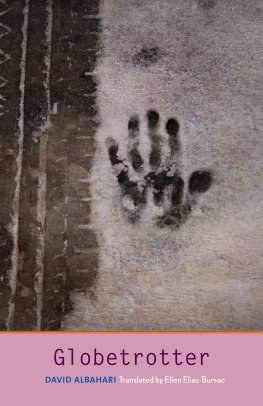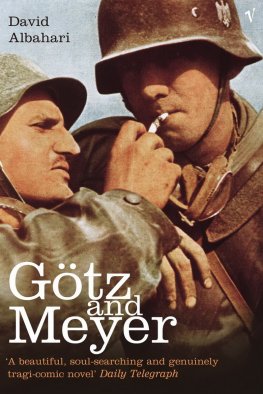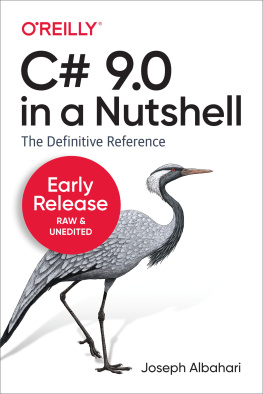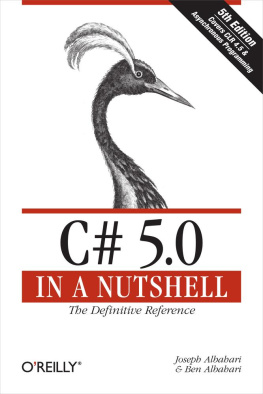David Albahari
Globetrotter
Everything in this book is imaginary, only Banff is real.
Cities are like women, I said to Daniel Atijas when we met at the Centre in Banff on June 11, 1998. You like the way some look, I said, and others you like for what they are on the inside. Some cities are neither, I said, and you are indifferent when you find yourself there, just as you are indifferent, I said, by the side of certain women. They are colorless, I said, like air. I thought hed say air is not colorless he struck me as that type of person, the kind who always, without being overbearing, states things as they are but he only sipped his soup and glanced out the window from time to time. Banff, I continued, is something else again, though this is not obvious at first, especially if you spend only a day or two here the way most people do, but if you stick around longer, I said, for a week, say, you will see what has intrigued me here for years: the special knack Banff has of appearing in two forms at once, as two extremes, one of which, if I dare pursue my parallel with women, I said, expresses the eternal virgin; the other, the lusty strumpet. Here I stopped. I had expected him to blink when he heard that last word he struck me as the type who would be ready to blink, whod feel no compulsion to hide honest embarrassment but he merely set down his spoon and reached for the salad.
Someone else might have been discouraged by having their expectations trounced twice, especially those who dread unpredictability, in which group I do not, I am glad to say, count myself, so in Daniel Atijass refusal to be candid sure as I was of my appraisal I could recognize and relish this degree of unpredictability, for it is exactly what challenges us and attracts us to a person. I rubbed my hands together under the table and said: This is why every time I come to Banff I start by thinking Ill write a book about it, though I know I never will; I am a painter, not a writer, and if I were a master of words, I would discard my paintbrush and paints straightaway because being a writer is so much better for the health than being a painter, because despite all the warnings about the dangers of computer and monitor radiation, at least a writer neednt inhale toxic fumes, poison himself with his work and here I stopped, not knowing how to get myself back to the writing of a book about Banff. But Daniel Atijas, as if he had been waiting, set down his knife and fork, coughed, and said: I have never been this high up in mountains; I am a child of the plains. I could have fallen straight off my chair, I was so surprised, not because he had finally spoken after all, I had been chatting away precisely to draw him out but because this hadnt even occurred to me, and it should have, for I, too, am a child of the plains, born in Saskatchewan, where, by the way, I live, so I should have recognized in him the reflection of his plains, which, I later learned, are called Vojvodina, for that makes us more similar than either of us might have reckoned. I did not, however, fall off my chair, though just in case, I firmly gripped the table edge, but then Daniel Atijas stood up, said he had to leave, and left.
There are people who, when they go, take something with them. Hard to say just what. Something opens in a person, and then something is gone: I dont know if I can say it any better. Daniel Atijas left and I sat there, choking on emotions in which I had ceased believing long ago. I repeated to myself several times, Steady now, then I took a deep breath and dropped my hands into my lap. After all, Daniel Atijas had struck me as the type who ups and goes like that, just as he had the evening before, when, excusing himself and blaming jet lag, he left the reception, held in his honor, after giving his talk and responding to questions for twenty minutes. I had sat in the second row during the talk, right behind the president of the Banff Centre and his wife. The presidents shoulder was specked with flakes of dandruff. Daniel Atijas waved his arms frequently as he talked, as if short of words, though he spoke readily in English. His pronunciation was hard-edged, Slavic, but still easily understood. He did not hide his feelings, and his voice quavered quite audibly several times, cracking before he reached the last lines. The presidents wife took out her handkerchief each time and dabbed the corners of her eyes as if to console them. Continuing to gesticulate, Daniel Atijas spoke of the relationship between history and literature in his country, in his former country, he said, or rather in the five countries that came out of the one that no longer existed. His voice quavered. Several days later, when I reminded him of this, I added that I, too, had trembled while listening to reports about the referendum on the secession of Quebec. We each have our own hell, replied Daniel Atijas.
Had I known, at the talk, he would say this, I would have better understood his behavior; I would have known that his hell was public speaking. Despite his emotions, quavering voice, and pointed humor, Daniel Atijas was forever digging in with his defenses. Instead of getting closer to his listeners, he pulled away, so at one point I felt like standing up and drawing him to me, to all of us. He looked, after all, like someone who is always inward bound, regardless of where he is headed. I told him so once: we were on the path running down by the city cemetery, and I stopped a little theatrically and, spreading my arms, said he struck me as someone who, no matter where he went, was always inward bound, to which he replied with a chuckle that it made no difference, since all of us end up in the same place. No doubt, I said, but not at the same cemetery. I have spent my whole life, I said, in Saskatchewan, in Saskatoon, and I wont be changing towns in death. Daniel Atijas laughed again. At the talk, however, he was serious, even when he interjected humor, always at an apt juncture, to ease the tension of his impassioned narrative. I didnt for a moment take my eyes off his face at the talk or on the path by the cemetery. After the talk I was barely able to hold my focus on the words the presidents wife was saying, and suddenly I wanted, right there in front of everyone, to thrust my tongue between her plump lips and shiny teeth. Before going to bed I had to rinse my mouth out twice with a mint-flavored mouthwash. I looked at myself in the mirror, gargled, and thought of Daniel Atijas. The first time I had seen him was actually in a photograph on a small poster announcing his talk. The posters were up, I saw over the following days, on all the Banff Centre buildings, but I had noticed one on the bulletin board by the reception desk when I was waiting for the young woman behind the counter to give me the keys to my room and studio.
The bulletin board was plastered with announcements, and the photograph of Daniel Atijas was partly obscured. I only glimpsed it out of the corner of my eye, but that did it. I left the young woman at the desk in mid-sentence, her sentence never would I have interrupted my own and went over to the bulletin board. Hard to say what I could compare that moment of recognition with, perhaps with the afternoon when, walking along a stream in Kananaskis, I came across a pebble that I still carry with me after all these years. I showed the pebble to Daniel Atijas, when what I was really wanting to do was to hold it up next to his face, though in the end I didnt. So there I was staring at the face in the picture and feeling the tiredness from the mornings early start and all the travel drop away as if I were donning some altogether-new clothes. The young woman tapped me lightly on the shoulder and handed me the keys. I was given a room on the second floor and studio number eight. When she had her back turned, I ripped the poster right off the bulletin board, folded it, and put it in my pocket. The room looked out on the craggy peak of Cascade Mountain. Mountain peaks always soothe me, as if I werent a person of the plains after all. That was how Daniel Atijas felt, too, he told me as we stood by the window in his third-floor room. At that point I knew much more about him than I could learn from the handful of terse sentences on the poster.












